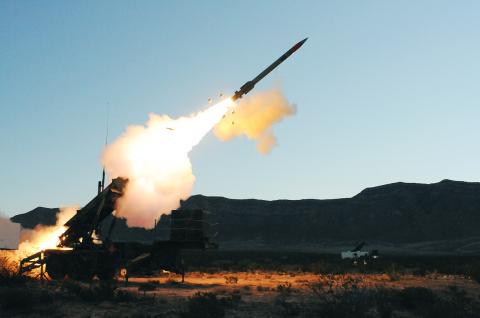After years of planning, work will officially begin early next month at sites around Greater Taichung and Greater Kaohsiung in preparation for the deployment of Patriot Advanced Capability-3 (PAC-3) air defense units purchased from the US, senior officials said yesterday.
In all, NT$61.4 million (US$2 million) has been set aside from next year’s budget to prepare the sites for four PAC-3 units in the two special municipalities. A private contractor will oversee work at the sites, a Ministry of National Defense spokesman said, declined to provide further information on the engineering contract, citing Government Procurement Act (政府採購法) regulations.
Taiwan currently deploys three PAC-2 units, which were recently upgraded to PAC-3 configuration, around Taipei in Wanli (萬里), Nangang (南港) and Sindian (新店). During negotiations under Chen Shui-bian’s (陳水扁) administration, it was decided that Taichung and Kaohsiung would both get Patriot units to protect the political and military centers, as well as critical infrastructure in central and southern parts of the country.

Photo courtesy of Lockheed Martin Corp
The ministry has reportedly mapped out a number of locations for the deployment of the PAC-3 units, including Greater Taichung’s Dadu Mountain (大肚山), Greater Kaohsiung’s Jenwu District (仁武), Greater Tainan’s Hutoupi (虎頭埤), as well as the Pingtung and Chiayi airports.
A military official would not confirm the sites chosen for the four units, which were included in the US$6.4 billion arms package notified to US Congress in October 2008 and are scheduled for delivery in 2014 or 2015. Two more units were part of a subsequent package announced in January 2010 and will be introduced as part of a future phase.
Raytheon Corp is the manufacturer of the fire units and radars, with Lockheed Martin Co producing the hit-to-kill missiles.
Taiwan has so far purchased a total of 388 PAC-3 missiles as part of the multibillion-dollar procurement deals. To increase the chances of intercept, PAC-3 doctrine calls for the use of two missiles per incoming target, a method known as “ripple firing.”
Although critics of the PAC-3 argue that the air defense system could easily be overwhelmed by a large number of Chinese ballistic missiles fired simultaneously or in close sequence, proponents of the system counter that from the beginning, the program was meant to deny Beijing the ability to engage in coercion by threatening limited missile attacks against key infrastructure to intimidate decisionmakers in Taipei.

Tropical Storm Gaemi strengthened into a typhoon at 2pm yesterday, and could make landfall in Yilan County tomorrow, the Central Weather Administration (CWA) said yesterday. The agency was scheduled to issue a sea warning at 11:30pm yesterday, and could issue a land warning later today. Gaemi was moving north-northwest at 4kph, carrying maximum sustained winds near its center of up to 118.8kph and gusts of 154.8kph. The circumference is forecast to reach eastern Taiwan tomorrow morning, with the center making landfall in Yilan County later that night before departing from the north coast, CWA weather forecaster Kuan Shin-ping (官欣平) said yesterday. Uncertainty remains and

SEA WARNING LIKELY: The storm, named Gaemi, could become a moderate typhoon on Wednesday or Thursday, with the Taipei City Government preparing for flooding A tropical depression east of the Philippines developed into a tropical storm named Gaemi at 2pm yesterday, and was moving toward eastern Taiwan, the Central Weather Administration (CWA) said. Gaemi could begin to affect Taiwan proper on Tuesday, lasting until Friday, and could develop into a moderate typhoon on Wednesday or Thursday, it said. A sea warning for Gaemi could be issued as early as Tuesday morning, it added. Gaemi, the third tropical storm in the Pacific Ocean this typhoon season, is projected to begin moving northwest today, and be closest to Taiwan on Wednesday or Thursday, the agency said. Today, there would likely

DISRUPTIONS: The high-speed rail is to operate as normal, while several airlines either canceled flights or announced early departures or late arrivals Schools and offices in 15 cities and counties are to be closed today due to Typhoon Gaemi, local governments announced last night. The 15 are: Taipei, New Taipei City, Taoyuan, Tainan, Keelung, Hsinchu and Kaohsiung, as well as Yilan, Hualien, Hsinchu, Miaoli, Chiayi, Pingtung, Penghu and Lienchiang counties. People should brace for torrential rainfall brought by the storm, with its center forecast to make landfall on the east coast between tonight and tomorrow morning, the Central Weather Administration (CWA) said. The agency issued a sea warning for the typhoon at 11:30pm on Monday, followed by a land warning at 11:30am yesterday. As of

CASUALTY: A 70-year-old woman was killed by a falling tree in Kaohsiung as the premier warned all government agencies to remain on high alert for the next 24 hours Schools and offices nationwide are to be closed for a second day today as Typhoon Gaemi crosses over the nation, bringing torrential rain and whipping winds. Gaemi was forecast to make landfall late last night. From Tuesday night, its outer band brought substantial rainfall and strong winds to the nation. As of 6:15pm last night, the typhoon’s center was 20km southeast of Hualien County, Central Weather Administration (CWA) data showed. It was moving at 19kph and had a radius of 250km. As of 3pm yesterday, one woman had died, while 58 people were injured, the Central Emergency Operation Center said. The 70-year-old